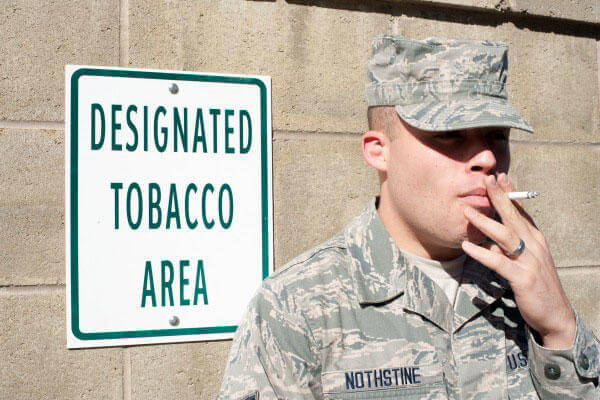Two senators on Wednesday called on the Defense Department to eliminate discounts on tobacco sales throughout the military as a cost-cutting measure in an era of tight budgets.
"That’s something that needs to go," Sen. Susan Collins, R-Maine, told Defense Secretary Chuck Hagel and Gen. Martin Dempsey at a hearing of the Senate Appropriations Committee on the Fiscal Year 2015 military budget.
Sen. Dick Durbin, D-Illinois, the committee’s chairman, said the Defense Department spends $1.6 billion annually on tobacco-related problems.
Durbin said that discounts at military facilities were a factor in troops smoking at a rate 20 percent higher than civilians. Durbin said military personnel use smokeless tobacco at a rate 400 percent higher than civilians.
Current Defense Department policy calls for tobacco discounts not to be "lower than 5 percent below the most competitive price in the local community." Defense Department surveys also show that smokers in the military say they do so to relieve stress and boredom.
In response to the senators’ questions, Hagel noted that a Defense Department review was underway on tobacco use in the military. Hagel also noted that smoking was banned on submarines and Navy Secretary Ray Mabus was considering a ban on tobacco sales at all Navy and Marine bases.
"I’m open minded" on proposals to curb smoking in the military, said Dempsey, chairman of the Joint Chiefs of Staff, but tobacco is a lawful product. "It is legal, and that is an issue for the broader Congress of the United States.
In March, Jonathan Woodson, the assistant secretary of Defense for Health Affairs, sent a memo to the services warning that tobacco use "undercuts military readiness and harms individual performance."
Woodson wrote that the "prominence of tobacco products in (military) retail outlets, and permission for smoking breaks while on duty, sustain the perception that we are not serious about reducing the use of tobacco."
On the House side, Rep. Duncan Hunter, R-California, who served tours as a Marine in Iraq and Afghanistan, attached an amendment to the military spending bill that would bar new restrictions on tobacco products.
In May, Hunter asked the House Armed Services Committee that "we sleep in the dirt for this country, we get shot at for this country, but we can't have a cigarette if we want to?"
In his testimony on the 2015 budget, Hagel generally stuck to previously announced recommendations on slowing the rate of pay increases, cutting the Army’s troop strength to 440,000-450,000 over the next five years, keeping 11 aircraft carriers for the Navy, and reducing the Marine Corps to 182,000.
The Air Force would be funded for the F-35 Joint Strike Fighter, the new Long Range Strike Bomber, and the KC-46 refueling tanker, but the U-2 spy plane and the A-10 Thunderbolt attack aircraft would be retired, Hagel said.
Hagel said his main concern was the readiness of the force, and under the budget limits imposed by the Congressional sequester process, "we cannot keep our current force structure adequately ready and modernized."
-- Richard Sisk can be reached at richard.sisk@monster.com











